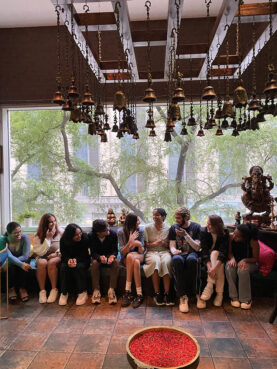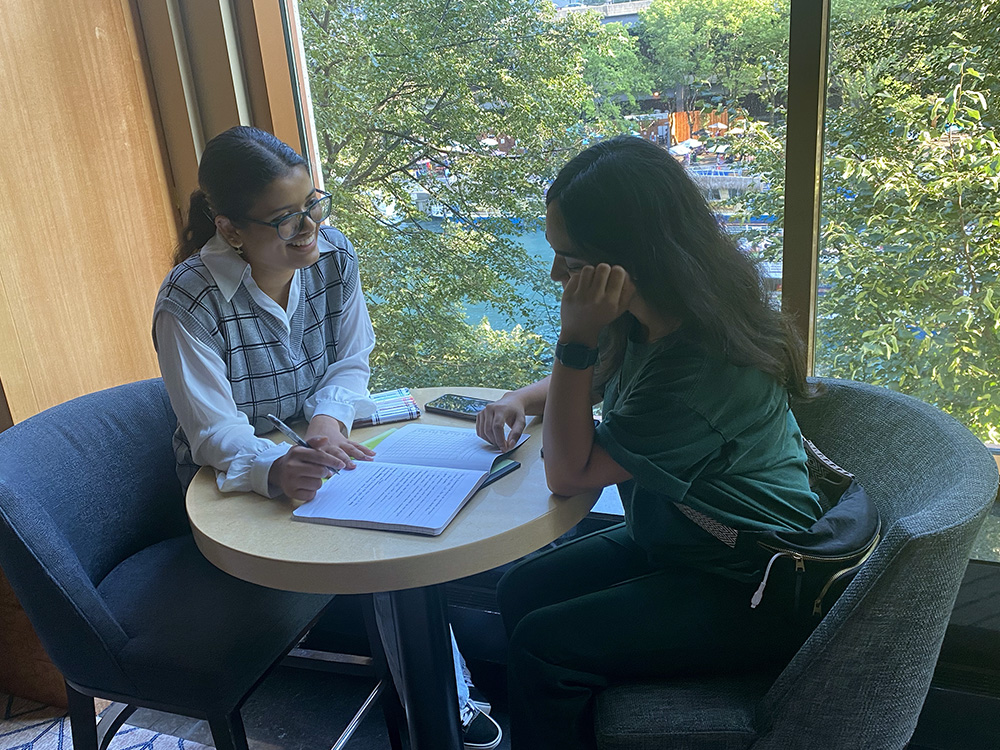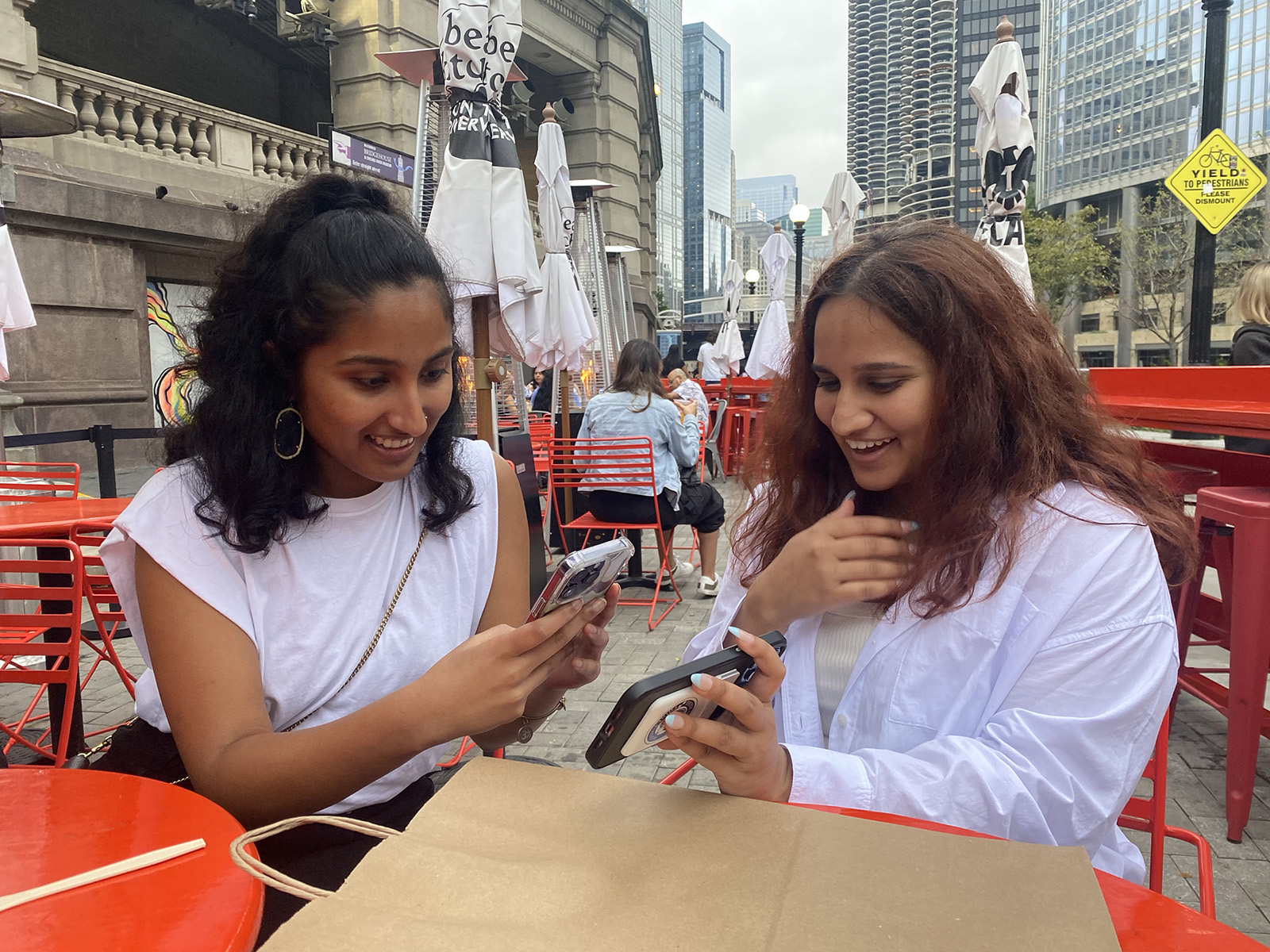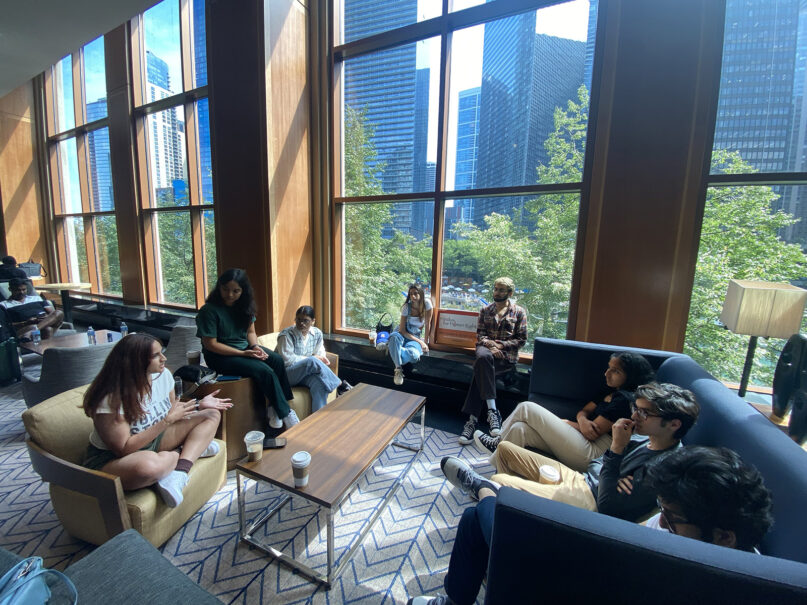(RNS) — When Shreya Aher moved to the United States to study international relations as a college student in 2021, she was shocked to find a distinct divide between faith groups she saw cohabiting every day back home in the central state of Maharashtra, India.
“It was very different for me to see how polarized this society is in comparison with the society that I grew up in,” said Aher, a junior at Drew University in New Jersey.
In India, Aher pointed out, Hindus and Muslims often live in the same towns and neighborhoods, praying in temples and mosques that are often on the same street. “We are all just humans. We all have different faiths, but if we remove that element, it’s just us and our emotions,” said Aher.
Hindu and Muslim leaders are now working to convince their communities of just that with an initiative called the Interfaith Harmony Student Fellowship. A collaboration between the progressive Hindus for Human Rights and the Indian American Muslim Council, the program has brought together 10 students, five Muslim and five Hindu, to host interfaith events on their campuses.

Interfaith Harmony fellows visit a Hindu temple in Chicago in August 2023. (Photo by Nancy Fowlkes)
The inaugural group includes students who attend Drew, Columbia University, Fordham University, College of William and Mary and the University of Illinois Chicago.
While Hindus and Muslims live mostly harmoniously in daily life in India, religious tensions have been on the rise as Indian Prime Minister Narendra Modi and his Hindu nationalist Bharatiya Janata Party have worked to marginalize the country’s large Muslim minority. In 2019, the BJP introduced the Citizen Amendment Act, which provided a pathway to Indian citizenship for persecuted religious minorities but explicitly left out Muslims.
Recently the United States Commission on International Religious Freedom designated India as a “country of particular concern.”
In Pakistan and Bangladesh, Muslim-majority countries abutting India, meanwhile, many residents say that discrimination against Hindu minorities persists.
The friction on both sides of the borders is fed, too, by the two groups’ longer history, rooted in pre-colonial invasions of South Asia by Islamic empires, the 1947 partition of India and Pakistan and the continuing conflict over the northern Indian region of Kashmir.
These divides, the fellowship’s organizers say, have followed immigrants to this country.
“Many Hindu and Muslim Americans have immediate family members abroad and have very personal connections to these tensions,” said Nancy Fowlkes, campus fellowship coordinator for Hindus for Human Rights. “Often there is a level of discomfort for Hindus and Muslims in the United States with even just the idea of forming friendships with one another.
“Our fellowship is an intervention that aims to work to break down the existing barriers between Hindu and Muslim communities,” she added.
In the present moment, organizers say, nobody is better suited to tackle these frictions than the college-age children of the diaspora, who, though well acquainted with the history through their parents, often approach the issues with less attachment.
“It’s incredibly hard to tell older generations who have lived a certain way their whole entire life to come to America and completely get rid of those preconceived notions and prejudices,” said Ramisha Tuba, a Muslim and Aher’s counterpart at Drew University. “It isn’t about the religion at its core; it’s something entirely different. We can fix this. We just need to stop for a second and talk to each other.”

Interfaith Harmony fellows Ramisha Tuba, left, and Shreya Aher work together in Chicago during the Interfaith America Leadership Summit in August 2023. (Photo by Nancy Fowlkes)
Tuba, 20, who studies behavioral science, came to the United States from Bangladesh at age 6. She was initially hesitant to participate in the fellowship, she said, because her upbringing in a conservative household left her with doubts about her faith. But interfaith work, and meeting Aher, has been eye-opening.
“You never know what you can learn when you actually interact with someone,” said Tuba.
“We’ve just been taking in what we’ve been told this entire time, about Islam, about Hinduism, about how the faiths are connected. In reality, we don’t know anything because we’ve never bothered to ask.”
RELATED: Gen Z Hindu Americans reckon with faith and politics
According to the fellows who spoke with Religion News Service, relationships among South Asian Americans can be distant, despite the common culture they often share, from food and sports to language and, not least, stories about their immigrant parents.
At the University of Illinois Chicago, the Indian Student Association and the Pakistani Student Association had never agreed to meet with each other until fellow Manasvi Thumu, a Hindu from India, reached out to plan an intercultural event.
“The main reason why a lot of us are divided,” said Thumu, a junior, “even though we have so many shared cultural experiences and shared identities, is because of the way our parents might think of each other’s religions.
“Once you know each other as people, and not communities, you can’t go back.”
The program began this summer, when the 10 fellows met for a week in Chicago to practice techniques for building interfaith dialogue. (Hint: Start with questions, not judgment.) The group attended the Interfaith America Leadership Summit, where participants were taught a variety of organizing skills, from how to make flyers to how to host a professional panel discussion.
The paired fellows will be working on events of their own design throughout the program’s year, which runs until May 2024, including South Asian movie nights, music concerts, community art projects and academic discussions between experts.

Interfaith Harmony fellows Manvi Nair, left, and Abhipri Chowdhury chat while in Chicago attending the Interfaith America Leadership Summit. (Photo by Nancy Fowlkes)
Malak Elghamrawi, a Muslim whose family emigrated from Egypt, said her education in everything from Bollywood, as India’s exuberant musical movie tradition is known, to jokes told in Hindi was exhilarating. “I felt so welcomed and embraced,” she said, “and I thought that was incredible and so fitting to the work we’re doing.”
Mostly, the fellows said, they bonded over their common experience of being American college students, which for some meant being independent of their parents for the first time.
“College is kind of a new slate for you as a person,” said Elghamrawi, who studies theater at Fordham, where young people “start to develop as a person and form your own opinions based on experiences. If that experience happens to be an inclusive environment and open, welcoming community, hopefully values you take from that will follow and apply to the rest of your life.”
Abhipri Chowdhury, Elghamrawi’s pair at Fordham, grew up in a nonreligious Hindu family. Chowdhury said participating in the program has changed her mind about not only her own culture but others’. After hearing two Christians, one conservative, one LGBTQ, debate at a panel discussion at the summit in Chicago, she saw how faith could be an avenue to understanding and a “doorway to stronger community,” as much as a point of difference.
“Coming into this school year,” she said, “I see myself much more open to different ideas than I was previously.”
This story was supported by the Solutions Journalism Network, a nonprofit organization dedicated to rigorous and compelling reporting about responses to social problems.





